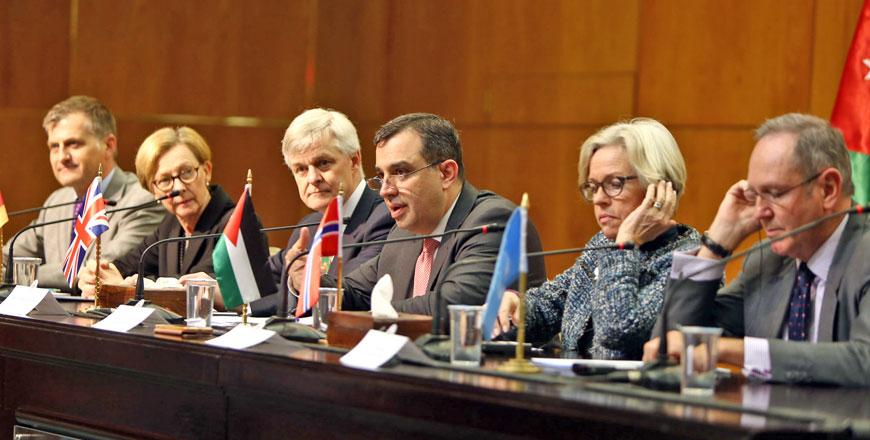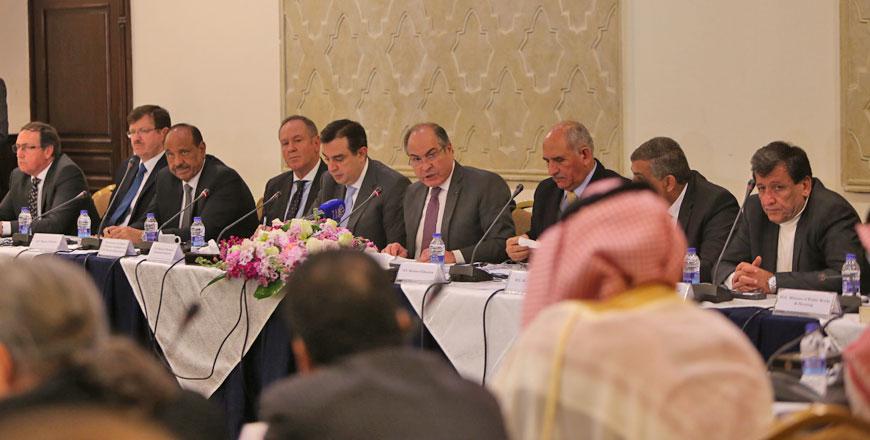You are here
Jordan secures 60% of required funds under 2016 refugee response plan
By Khetam Malkawi - Feb 13,2017 - Last updated at Feb 13,2017

Minister of Planning and International Cooperation Imad Fakhoury meets with envoys of donor countries over response to Syrian refugee crisis in Amman on Monday (Petra photo)
AMMAN — Jordan has secured 60 per cent of the funding required under the 2016 Jordan Response Plan (JRP) to the Syrian crisis, double what was obtained in each of the previous three years, Minister of Planning and International Cooperation Imad Fakhoury said on Monday.
Actual contracted funding, as additional grants, to JRP reached approximately 60 per cent of required funding needs for 2016,“ an improved response compared to one-third funding rates in previous years,” Fakhoury said, adding that in 2015, Jordan secured 36 per cent of the appeal value.
In addition to grants the Kingdom received under the JRP, concessional financing extended to Jordan in 2016 in the context of the London conference reached $923.6 million (contracted loans), of which $834.6 million is for budget support and $89 million for development projects, according to the minister.
At a joint press conference with the ambassadors of donor countries to announce progress after one year since the London conference that took place last February, and prior to this year’s conference that will be hosted by the EU in Brussels in the spring, the minister said in spite of this increased level of support, fiscal, economic and social challenges remain.
“It is therefore critical to sustain the momentum in 2017 to address needs in the 2017 JRP, thus, maintaining basic services for Syrians and host communities, sustaining development gains, and supporting Jordan’s resilience and stability,” Fakhoury added.
However, he said, while the Kingdom appreciates the support committed so far, moving forward, the pressure remains on the delivery of $1 billion ambitiously outlined in the Jordan Compact to support the implementation of the Ministry of Education’s plan to accelerate access of refugees to quality formal education.
“Our focus in 2017 should be to do more on school construction and refurbishment, classroom additions and teacher training, among other efforts,” Fakhoury said, adding that some sectors are saturated and need more support, foremost of which is the education sector.
Thus, he noted, building and rehabilitating schools in Jordan is a priority.
According to the minister, of the $333 million pledged for education last year, almost 50 per cent has been funded.
Fakhoury also noted that the Jordan-EU simplified rules of origin deal was one of the successes achieved as an outcome of the London conference.
With support from the UK and USAID, he noted, Jordan is conducting a pilot project to identify 20 export-ready companies to be matched with potential buyers and distributers in the EU.
“We look forward to working together to scale up this support in the near future, creating tailor-made technical assistance to help local industries meet European standards and requirements in order to export to the EU,” the minister explained.
So far, six companies are qualified to export to Europe under the Jordan-EU agreement on simplified rules of origin.
Speaking at the press conference, British Ambassador to Jordan Edward Oakden said the London conference in 2016 led to a doubling of international support to the JRP, reaching unprecedented levels.
Last year, UK’s support to Jordan reached $250 million.
On education, Oakden said, UK support has helped train 2,700 teachers and provided maintenance to 320 schools across the country in 2016.
“We’re supporting vital services, like the provision of 30 additional rubbish trucks in Amman to help manage increased levels of waste,” the ambassador said, adding that in the economic field, the UK supports initiatives that help young people find jobs, like renewable engineering skills for students from Maan, where over 80 per cent of participants are now employed.
EU Ambassador to Jordan Andrea Matteo Fontana said the EU and its member states have delivered on the ambitious pledges made in London one year ago.
“Almost $1.5 billion has been committed to Jordan in 2016, of which more than $1.1 billion in grants, mainly for humanitarian assistance, education, municipal services, water and sanitation and livelihoods,” Fontana said.
The envoy added that the funding far exceeded the pledge of $1.027 billion made at London by the international community.
“The commitments of the EU and its member states totalled 76 per cent of the pledges made by the international community at the London conference.”
Meanwhile, Sissel Breie, the Norwegian ambassador to the Kingdom, said Oslo pledged close to $1.2 billion for Syria and neighbouring countries at the London conference.
“We disbursed more than $310 million last year. Approximately $35 million went to Jordan as direct support,” Breie added.
German Ambassador to Jordan Birgitta Siefker-Eberle underlined that Germany pledged $2.5 billion for the region at the London conference, out of which $1.3 billion was allotted for 2016.
To Jordan, Siefker-Eberle said, her country committed $525 million in 2016, “which is more than double the amount Jordan received, in average, during the preceding years”.
In addition, the ambassador added that her country is extending support to build 13 schools this year, and to rehabilitate others.
UN Resident and Humanitarian Coordinator David McLachlan-Karr, said that following the London conference, Jordan took a courageous political decision to open the labour market for Syrians.
The UN official also described the JRP as a model that will continue to offer a future of hope for Syrians and Jordanians alike.
McLachlan-Karr said that the cash transfers and food vouchers given to Syrian refugees injected $300 million in Jordan’s economy last year.
Meanwhile, Fakhoury said, the JRP marked a shift in funding channelled to address the Syrian crisis, noting that in the beginning, 30 per cent of the funds were directed to host communities, which has been increased to 50 per cent recently.
This year, the EU will host an international conference in Brussels on the future of Syria and the region.
Related Articles
AMMAN — The government and the international community on Thursday endorsed a $7.6-billion three-year Jordan Response Platform (JRP) for the
AMMAN — The Cabinet has approved a package of donor-funded projects to help Jordanian communities cope with the influx of Syrian refugees, P
AMMAN — Minister of Planning and International Cooperation Imad Fakhoury on Saturday said that donor countries and organisations have so far
















